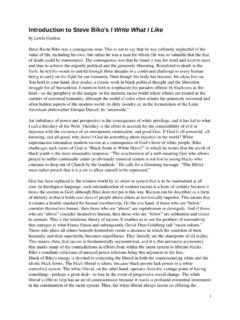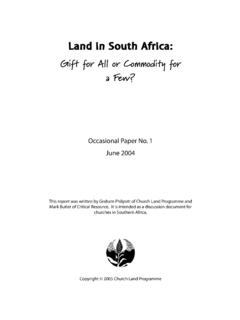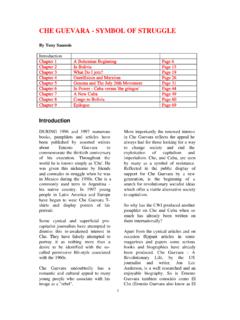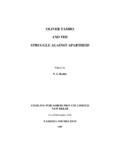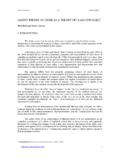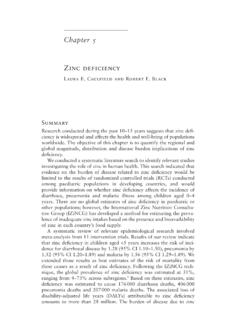Transcription of FANON AND (POST)APARTHEID SOUTH AFRICA
1 Chapter Fourteen FANON and the Land Question in ( post ) apartheid SOUTH AFRICA Mabogo Percy More For the colonized people the most essential value, because the most concrete, is first and foremost the land; the land which will bring them bread and above all, dignity ( FANON , The Wretched of the Earth). One of the most famous and prophetic chapters of The Wretched of the Earth is the one variously translated as the The Pitfalls of National Consciousness or On the Misadventures of National Consciousness. It has been fifty years since FANON made his predictions about the future of post -independent African states, and despite the existing evidence of their almost correctness and precision, SOUTH AFRICA , being the last African state liberated from the clutches of apartheid colonialism, has failed to learn from FANON and avoid the pitfalls of the national bourgeoisie of post -independent African states.
2 Consequently, almost the entire diagnosis FANON makes about post -independent African states in this chapter applies with stunning exactness to post - apartheid SOUTH AFRICA , precisely because, as FANON observes, the national bourgeoisie is incapable of learning its lesson (1968:67). Indeed it seems as though FANON wrote this chapter with post - apartheid New SOUTH AFRICA in mind. I argue, in this chapter, that the problem for SOUTH AFRICA can fundamentally be traced to the distinction FANON consistently makes in both Black Skin, White Masks and Toward the African Revolution and later in The Wretched of the Earth the distinction between pseudo-independence or flag-independence and real-independence, in other words, between decolonization and sovereign independence. For FANON , pseudo or flag independence is the product of a negotiated settlement between the nationalist leaders of the colonized and the colonizers, whereas real or authentic independence emerges not from a negotiated settlement but from the re-appropriation of power and the land through violent struggle.
3 FLAG FREEDOM. In the chapter The Negro and Recognition of Black Skin, White Masks, FANON utilizes the Hegelian master/slave paradigm to articulate the difference between abstract freedom and true freedom, which in political terms would translate to what he calls flag or psuedo and genuine or real independence, respectively. Recognition, as Hegel argued, requires reciprocal recognition in order to affirm cooperation, mutual respect and dignity between two self-consciousnesses. Before this can be achieved, there must be conflict, a battle, and a life and death struggle. In situations such as some colonial world or apartheid SOUTH AFRICA , where a violent revolution has not occurred in its full expression, neo-slavery takes over. In such a world, FANON writes: There is not an open conflict between white and black (1967a:217). Anticipating what came to be known as the SOUTH African miracle transition from apartheid to democracy, FANON adds that within such a racist colonial ideology and culture, the black man is not a man.
4 This means that for FANON , Hegel's master/slave dialectic does not completely apply to the white master and the black slave of the colonial situation. Black humanity is not fought for by the black person but is conferred upon him/her through the mercy and generosity of the white master. As FANON puts it: One day the white master, without conflict, recognized the Negro slave (1967a:217). In a situation where recognition is given without conflict, the master's recognition amounts to nothing more than a simple gesture, for it still leaves the slave in bondage, albeit being upgraded to the status of a human being. The gift of humanhood without a struggle still constitutes the slave as a slave since he/she has not attained independent self-consciousness and thus remains dominated by the master. During a serious meeting of the masters, one of them, FANON supposes, courageously says to his peers: Let's be nice to the niggers (1967a:220).
5 After a lengthy argument the other masters finally decided to promote the machine-animal men to the supreme rank of men (1967a:220). Through the very fact that the masters decided to promote, that is, made a concession to the Negroes, they invariably continued to retain their superiority and masterhood by other means. This decision, FANON declares, is then followed by a legal declaration of emancipation, a proclamation of independence. In his capacity qua master, the white master declares to the black person, From now on you are free (1967a:220). The news of liberty causes a stir of jubilation among the slaves. But this occurrence, this development, this freedom emerges from without and not from within the slave. External liberation, FANON argues, in no way leads to genuine liberation. The slave has been acted upon rather than acting: The upheaval reached the Negroes from without. The black man was acted upon.
6 Values that had been created by his actions, values that had not been born of the systolic tide of his blood, danced in a hued whirl round him. The upheaval did not make a difference in the Negro. He went from one way of life to another, but not from one life to another (1967a:220). The resonance of these predictive insights with the events immediately prior to and after Nelson Mandela's release from Victor Verster Prison twenty years ago from now is stunning in many respects. Indeed, pressured by internal and external demands and resistance, the apartheid regime decided to recognize the Black person, to promote the machine-animal men to the supreme rank of men. Just as FANON imagined, the reaction of the other masters to the suggestion of being nice to the niggers, when de Klerk presented his negotiation settlement plan with the ANC to his cabinet for ratification, was that of outrage. It is reported that one incensed Minister shouted at de Klerk: What have you done?
7 ! You have given SOUTH AFRICA away (cited in Giliomee 1996:16,18)! In their capacity qua masters, de Klerk and his Nationalist party then declared, not only to Mandela alone but to the whole Black population: From now on you are free. The news of Mandela's release from prison and what it implied for the future caused pandemonium. Commenting about the mayhem and the jubilant crowds of Black people that awaited him at the gates of the prison and at Cape Town's Grand Parade where he delivered his first speech, Mandela wrote in Long Walk to Freedom: I was astounded and a little bit alarmed. I had truly not expected such a scene I walked out on the balcony and saw a great sea of people before me (1994:673). More jubilation was to follow with the declaration of emancipation in April 1994 during the first general democratic elections. President de Klerk had sprung a surprise on Mandela and almost all SOUTH AFRICA by first unbanning all previously banned political parties, releasing Mandela and declaring emancipation for the machine-men.
8 ' Mandela admits that his release came as a surprise to me. It is evident that Mandela and Black people were all acted upon by de Klerk, that is, their freedom emerged from without and not within themselves. It should be remembered here that FANON makes a distinction between external freedom and internal freedom. The upheaval, as FANON indicates, since it was an upheaval from without, does make an external difference to the situation of the slave. However, it does not internally free the slave from his or her slavish consciousness. Though freed, the slave retains a slave consciousness precisely because this freedom is not a consequence of a struggle for liberation but a result of being acted upon by the master. What FANON suggests here is that freedom is more than the absence of external limitation or obstacles. Anticipating Biko and the Black Consciousness Movement, freedom for FANON involves a liberated consciousness; without freedom from within, freedom from without means virtually nothing.
9 Many critics and interpreters of FANON fail to make the distinction between freedom (internal freedom) and liberty (external freedom), in other words, Isaiah Berlin's notion of freedom to and freedom from. 11 Liberty from or external freedom is what one is able to do without constraints, that is, the presence or absence of limitation or obstacles, while freedom to involves the way in which an individual makes choices and assumes responsibility for those choices. What this distinction points to is that one can be free where there is no liberty at all or alternatively one can enjoy liberty without being free. The one does not necessarily entail the other. Hence FANON contends, The liberation of the individual does not follow national liberation. An authentic national liberation exists only to the degree to which the individual has irreversibly begun his own liberation (1967b:103). For FANON , therefore, decolonization qua liberation occurs at two levels, (1) the physical level as an act of freeing the land from the colonizer, (2) the psychological level as an act of freeing the consciousness of the colonized from the fear of the master, inferiority complex and self-hate.
10 FANON echoes the belief long held by some black antiracist, anti-colonialist and anti-slavery thinkers; that black people need to free themselves psychologically before they can succeed at liberating themselves politically. James Cone puts the matter in these terms: Freedom is what happens to a man on the inside; it is what happens to a man's being. It has nothing to do with voting, matching, picketing or rioting, though all may be manifestations of it. No man can give me freedom or help me get it (1969:28). This idea resonates with the view of many black thinkers who also believed that the oppressed must realize that freedom is not another's to give or bestow; it must be taken. Formal liberation is meaningless: true freedom substantive freedom cannot be conferred upon a people who are not willing to work or struggle, if need be to sacrifice in order to attain it. In the words of Paulo Freire, Freedom is acquired by conquest, not by gift.
